|
|
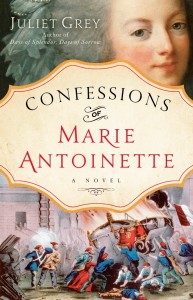 The revolutionaries are taking France over. Before Marie Antoinette realizes it, they’ve invaded her home and threatened the lives of her family and loved ones. Marie Antoinette herself is reviled as a foreign, an inconsiderate woman who has no discrimination about who she sleeps with or why. She must be the cause of all the wrongs that the people have experienced and they are calling for her head. The Revolution is right at the gates of Versailles and the once-loved King and Queen of France become, somehow, enemies of the people, prisoners of the state, their lives hanging by fragile threads. The revolutionaries are taking France over. Before Marie Antoinette realizes it, they’ve invaded her home and threatened the lives of her family and loved ones. Marie Antoinette herself is reviled as a foreign, an inconsiderate woman who has no discrimination about who she sleeps with or why. She must be the cause of all the wrongs that the people have experienced and they are calling for her head. The Revolution is right at the gates of Versailles and the once-loved King and Queen of France become, somehow, enemies of the people, prisoners of the state, their lives hanging by fragile threads.
This story was never going to end well. Everyone who has even the remotest familiarity with French history knows the fate of Louis XVI and Marie Antoinette. An author who isn’t writing an alternate history knows the ending. Still, though, after spending this whole trilogy with Marie Antoinette, the final volume of her story is heart-breaking. I can’t begin to imagine how it must have felt for the author, and the many people who choose this tragic woman as their subject, once the final page is written.
Despite the inevitable ending and the gradually more desperate tone of the book, Confessions of Marie Antoinette is a book that continued the excellence of the rest of the trilogy and concluded it in a way that is perfectly appropriate to Marie Antoinette’s story. The book is not without its moments. I thought personally one of the most touching was the way in which their immediate family was drawn closer together, towards the middle of the book. In captivity, stripped of the trappings of royalty, the “Capets” become a small, surprisingly loving nuclear family. They’re weathering a crisis together and it does indeed bring them together.
Somehow this makes the rest of the book all the sadder.
Grey navigates the confusing environment of the French Revolution deftly. It would be easy to get bogged down in politics, but she always manages to keep a central focus on Marie Antoinette and her family. While there is necessarily an element of telling, not showing, owing to the fact that Marie Antoinette spends a lot of the book away from the action, I never felt like the story slowed to accommodate it.
Instead, Grey uses a second viewpoint character, Louison, to give us an idea of the revolutionary feeling. I think Louison is intended to show how the citizens could get so caught up in revolutionary fervor that they let a minority commit truly radical acts. I never really connected with her, though, maybe because I was too busy feeling for the royal family.
I would definitely recommend this trilogy of books to anyone who is interested in reading excellent fiction about Marie Antoinette. As the conclusion, Confessions of Marie Antoinette is just as good as the previous two books by Juliet Grey, perfect for historical fiction lovers.
I read this book as part of the Historical Fiction Virtual Book Tour. For more viewpoints, check out the tour schedule.
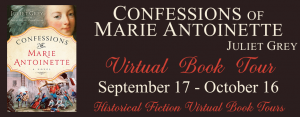
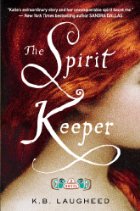 Katie O’Toole is the unlucky thirteenth child of Irish immigrants, living in the wilds of Pennsylvania, when Native Americans attack her small town and kill many of her family. Katie, however, with her flaming red hair and bright blue eyes, is hailed by one of the natives as the subject of his vision. Instead of being harmed, she is treated as precious and given the “choice” of going along with two natives – both of a different clan than the attackers – or staying with her family and being ransomed back to her family. For Katie this requires almost no thought, as she’s spent her life in unappreciated semi-servitude to her parents and siblings, but she vastly underestimates the difficulties that face her as she and her two new companions make their way west. Katie O’Toole is the unlucky thirteenth child of Irish immigrants, living in the wilds of Pennsylvania, when Native Americans attack her small town and kill many of her family. Katie, however, with her flaming red hair and bright blue eyes, is hailed by one of the natives as the subject of his vision. Instead of being harmed, she is treated as precious and given the “choice” of going along with two natives – both of a different clan than the attackers – or staying with her family and being ransomed back to her family. For Katie this requires almost no thought, as she’s spent her life in unappreciated semi-servitude to her parents and siblings, but she vastly underestimates the difficulties that face her as she and her two new companions make their way west.
I was genuinely surprised by how very much I enjoyed this book. The description sounded enticing, but I tried to go into it with no expectations in case it didn’t work out the way that I hoped. Instead, it far surpassed my expectations. This ended up being a delightful book that still manages to handle some very serious and important concerns.
First of all, racism. The early American colonists were very, very wrong in their treatment of Native Americans, basically claiming every last bit of land in the country that they made up (ignoring previous boundaries and societal organizations). Katie is the sole narrator of this book, but she witnesses prejudices first hand against her companions on numerous occasions. She even makes up her own misconceptions based on that racism, only to have them knocked down and torn apart by the men she’s travelling with. In this case she doesn’t know any better, doesn’t know anything different from what she’s been told. She naively assumes that their expectations of life match her expectations of life and watching that change as she realized that she was dealing with a people completely different from her own was fascinating. If anything it shows how important it is to broaden our horizons and open our minds.
Katie also undergoes a significant period of grief, which I can’t touch on without spoiling the story. But it was a moving experience and really showed how naive she was, despite the hardships of her life before. It’s almost as though, after that complete change, she no longer applies the logic of her previous life to her current life. I really enjoyed Katie as a character overall, actually; I found her easy to relate to and learn along with her about the new world that she finds herself in.
The book is written in a style meant to mimic how a woman of her era would have spoken or written, which I found distracting at first but then basically stopped noticing as I got further into the book. I’m not sure how others would feel about this, but it definitely didn’t get in the way of my appreciation of the book, although I can’t say it added much.
And, of course, The Spirit Keeper has an absolutely wonderful romance with just a touch of fantasy – interpretation left up to the reader mainly. Again, I don’t want to give away any details, but I really loved this aspect of the book. The book only ended too soon – I’d have happily kept on reading for another hundred pages. I look forward to more from K. B. Laugheed in the future.
All external book links are affiliate books. I received this book for free for review.
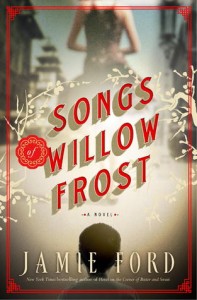 Twelve year old William is an orphan, as far as he knows. From the moment his mother’s limp body was carried away five years ago, he’s been a lost soul at an orphanage in Seattle. He has a few friends, including his blind best friend Charlotte, but he longs for a family. As a Chinese-American, though, his chances for adoption are incredibly slim, and he’s resigned himself to years of the same treatment. On the orphans’ collective, made-up birthday, he’s taken to see a movie. To his shock, William recognizes an actress in the film – his mother! Willow Frost looks and sounds just like the beautiful mother he lost five years ago. William decides that he simply must find her and begins in earnest to seek his family again. Twelve year old William is an orphan, as far as he knows. From the moment his mother’s limp body was carried away five years ago, he’s been a lost soul at an orphanage in Seattle. He has a few friends, including his blind best friend Charlotte, but he longs for a family. As a Chinese-American, though, his chances for adoption are incredibly slim, and he’s resigned himself to years of the same treatment. On the orphans’ collective, made-up birthday, he’s taken to see a movie. To his shock, William recognizes an actress in the film – his mother! Willow Frost looks and sounds just like the beautiful mother he lost five years ago. William decides that he simply must find her and begins in earnest to seek his family again.
A few years ago I read Jamie Ford’s Hotel on the Corner of Bitter and Sweet, a book that I really liked and which I still think about sometimes. I was very much looking forward to this book, so perhaps a bit of disappointment was inevitable. William’s story just didn’t grab me in the same way, nor did the intertwined tale of his mother. The story is actually considerably depressing, as life was for a Chinese woman left mostly to fend for herself as Willow was. I desperately wanted life to improve for her, but as their stories unfolded, William’s place in the orphanage made the outcome clear.
This was still a very beautifully written book, with a number of evocative scenes. I’m honestly not sure why I personally failed to connect with it when I felt so strongly about Ford’s previous book. Looking back on reading it, most of what I remember is rainy, dreary Seattle and the insurmountable hardships that Willow faced throughout her young life, as well as certain plot events around William that I can’t share. I wanted to reach into the book and fix everything for each of the characters, but sadly that isn’t something actually possible.
Would I still recommend that others read this book? I think so. It’s still a telling portrait of the life of Chinese-Americans in the early twentieth century and the difficult lives they faced. It also paints a picture of early Hollywood. Some of the relationships within are very well written, too. My experience doesn’t seem common, but overall I don’t think this was the book for me. Still, if you would enjoy the elements described above, I suspect you would greatly appreciate Songs of Willow Frost.
All external book links are affiliate links. I received this book for free for review.
 In the seventh installment of Bernard Cornwell’s Warrior Chronicles, Uhtred of Bebbanburg has fallen from the favour of the King of Wessex. Unfortunately, he’s also fallen from the favour of the Mercians. Double dealing drives him from his home and he decides that the time is ripe to take back what is his – Bebbanburg. Leading a small band of loyal retainers north, Uhtred sneaks his way into the home of his ancestors, but capturing what is his may be a goal that eludes him once again. As Danes and Saxons struggle for control of the British isles, where will Uhtred fit in? In the seventh installment of Bernard Cornwell’s Warrior Chronicles, Uhtred of Bebbanburg has fallen from the favour of the King of Wessex. Unfortunately, he’s also fallen from the favour of the Mercians. Double dealing drives him from his home and he decides that the time is ripe to take back what is his – Bebbanburg. Leading a small band of loyal retainers north, Uhtred sneaks his way into the home of his ancestors, but capturing what is his may be a goal that eludes him once again. As Danes and Saxons struggle for control of the British isles, where will Uhtred fit in?
By this point in the series, I feel like I’ve grown to know Uhtred very, very well. He’s aged and grown somewhat wiser through the years of the story; when he remembers his younger years, it’s easy for the reader to remember them, too, through the books. It’s a strange position for a series to be in, because we’re intimately acquainted with all the characters and conflicts, but the author has to keep the series fresh and maintain interest. With six books to get through before this one, new readers may be put off. They shouldn’t be, though – Cornwell’s books are amongst the best historical fiction has to offer on the Anglo-Saxon period and I love seeing the kingdom of England rise through his eyes.
Because really, that’s what these books are about. Uhtred’s personal struggles are certainly there, with his strong desire to retake his home castle of Bebbanburg and to be with the people he loves, but central to each is the fact that there is a huge struggle between Danes and Saxons that clearly is going to come to an end. As this is history, we know that the Anglo-Saxons win the day and create a united England, but Uhtred doesn’t know that. Cornwell is excellent at telling the story as it comes, so that Uhtred makes no assumptions about what is going to happen. Instead, he focuses on his own goals and loyalties, sticking to a personal moral code and to the men who have gained his loyalty over the last few years.
This book remains as solidly enjoyable as the rest of the series. I love following Uhtred’s adventures. He’s such a great character and he’s really well defined. The battle scenes are as vivid as ever, putting readers straight into the middle of the action so that I could almost feel what it would be like to stand in the shield wall. This part of Anglo-Saxon history is one of my favorites and it’s fascinating watching England come together through his eyes. As I was reading this book initially, I wondered how long the series would go on, but at this point I think it really has to continue until England is united, and I hope Uhtred is there to see it happen.
I recommend The Pagan Lord as I would with every installment of the series, but I do recommend starting with The Last Kingdom, the first of Uhtred’s adventures. It will put everything in context.
All external book links are affiliate links. I received this book for free for review.
 In anticipation of the UK release of The Pagan Lord by Bernard Cornwell, the seventh in the Warrior Chronicles, I’ve got an early excerpt to tempt you for publication date on Thursday! Come back tomorrow for my review. In anticipation of the UK release of The Pagan Lord by Bernard Cornwell, the seventh in the Warrior Chronicles, I’ve got an early excerpt to tempt you for publication date on Thursday! Come back tomorrow for my review.
“None of us knew the country, or which way we should go, so I simply followed the Roman road until it joined another that ran north and south. ‘We keep going west,’ I told Finan.
‘Just west?’
‘We’ll find somewhere we know.’
‘Or ride to the world’s end,’ he said happily.
The fog was lifting and the land rose slowly until we reached a rolling upland where there were fat farms and big halls half hidden by groves of good trees, and though I was sure folk saw us, no one came to enquire what brought us to their land. We were armed men, best left alone. I sent scouts ahead as I always did in hostile country, and this land was certainly hostile. We were either in Cnut’s land or Sigurd’s territory and all the halls would be Danish. The scouts rode either side of the road, using woods or hedgerows for cover and always looking for any sign of an enemy, but we met none. Once, on the second day, five horsemen came towards us from the north, but they saw our numbers and veered away.
We were among higher hills by then. The villages were smaller and more scattered, the halls less wealthy. I sent my Danes to purchase ale and food from the halls and the Saxons to buy provisions from the villages, but there was scarce any spare food because so many armed bands had been this way before us. I went to one hall where an old man greeted me. ‘I am Orlyg Orlygson,’ he said proudly.
‘Wulf Ranulfson,’ I responded.
‘I have not heard of you,’ he said, ‘but you’re welcome.’ He limped because of an old wound in his left leg. ‘And where does Wulf Ranulfson ride?’
‘To join Jarl Cnut.’
‘You’re late,’ he said, ‘the summons was for the moon’s death. She’s growing again.’
‘We’ll find him.’
‘I wish I could go,’ Orlyg patted his injured leg, ‘but what use is an old man?’ He looked at my companions. ‘Just seven of you?’
I gestured vaguely northwards. ‘I’ve got three crews on the road.’
‘Three! I can’t feed that many. But I’ll have my steward find you something. Come inside, come inside!’ He wanted to talk. Like all of us, he welcomed travellers if they brought news, and so I sat in his hall and petted his hounds and invented tales about Frisia. I said the harvest there would be poor.
‘Here too!’ Orlyg said gloomily.
‘But there is good news,’ I went on, ‘I heard that Uhtred Uhtredson attacked Bebbanburg and failed.’
‘Not just failed,’ Orlyg said, ‘he was killed there!’ I just stared at him and he grinned at the surprise on my face. ‘You hadn’t heard?’ he asked.
‘Uhtred Uhtredson was killed?’ I could not keep the astonishment from my voice. ‘I heard that he failed,’ I went on, ‘but he survived.’
‘Oh no,’ Orlyg said confidently, ‘he died. The man who told me was a witness to the fight.’ He pushed his fingers into his tangled white beard to touch the hammer at his neck. ‘He was cut down by the Lord Ælfric. Or maybe it was Ælfric’s son. The man wasn’t sure, but it was one of them.’
‘I heard Ælfric died,’ I said.
‘Then it must have been the son who dealt the blow,’ Orlyg said, ‘but it’s true! Uhtred Uhtredson is dead.’
‘That will make Jarl Cnut’s life easier,’ I said.
They all feared Uhtred,’ Orlyg said, ‘and no wonder. He was a warrior!’ He looked wistful for a moment. ‘I saw him once.’
‘You did?’
‘A big man, tall. He carried an iron shield.’
‘I heard that,’ I said. I had never carried an iron shield in my life.
‘He was fearsome, right enough,’ Orlyg said, ‘but a warrior.’
‘He belongs to the Corpse-Ripper now.’
‘Someone should go to the Lord Ælfric,’ Orlyg suggested, ‘and buy the fiend’s corpse.’
‘Why?’
‘To make the skull into a drinking cup, of course! It would make a fine gift for Jarl Cnut.’
‘The jarl will have drinking cups enough,’ I said, ‘when he’s beaten Æthelred and Edward.’
‘And he will,’ Orlyg said enthusiastically. He smiled. ‘At Yule, my friend, we shall all drink from Edward’s skull and dine in Edward’s hall and use Edward’s wife for pleasure!’
‘I heard Jarl Cnut’s wife was captured by Uhtred,’ I said.
‘A rumour, my friend, a rumour. You can’t believe everything you hear. I’ve learned that much over the years. Men come here and give me news and we celebrate it and then discover it isn’t true at all!’ He chuckled.
‘So perhaps Uhtred lives,’ I suggested mischievously.
‘Oh no! That is true, my friend. He was chopped down in battle, and he still lived, so they tied him to a post and loosed the dogs on him. They tore him to bits!’ He shook his head. ‘I’m glad he’s dead, but that’s no way for a warrior to die.’
I watched as servants carried ale, bread and smoked meat to my men waiting in the orchard. ‘To find the jarl,’ I asked Orlyg, ‘we keep going west?’
‘Cross the hills,’ he said, ‘and just follow the road. The jarl won’t be in any of his halls, he’ll have sailed south by now.’
‘To Wessex?’
‘To wherever he wants!’ Orlyg said. ‘But if you follow the road west you’ll come to Cesterfelda and you can ask there.’ He frowned. ‘I think you go from there to Buchestanes and the jarl has a hall there, a fine hall! One of his favourite halls, and there’ll be men in the hall who’ll tell you where to find him.’ “
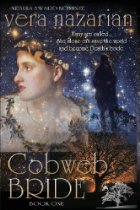 In all four corners of the world, people are about to die. Every moment, someone’s struggle comes to an end. But suddenly, death stops. No one can die, even those with mortal wounds. All of the citizens in the Kingdom of Lethe are perplexed and terrified. Battles rage on, assassinations fail spectacularly, and the elderly continue suffering past their time. Then Death himself arrives and asks for his Cobweb Bride. Only once his bride is found will death resume and the kingdom return to normal. But with no sign of the Cobweb Bride and no hints on where to find her, how will the citizens restore normality to their lives? In all four corners of the world, people are about to die. Every moment, someone’s struggle comes to an end. But suddenly, death stops. No one can die, even those with mortal wounds. All of the citizens in the Kingdom of Lethe are perplexed and terrified. Battles rage on, assassinations fail spectacularly, and the elderly continue suffering past their time. Then Death himself arrives and asks for his Cobweb Bride. Only once his bride is found will death resume and the kingdom return to normal. But with no sign of the Cobweb Bride and no hints on where to find her, how will the citizens restore normality to their lives?
Cobweb Bride is a crowd-funded phenomenon by the award-winning author Vera Nazarian. This, plus the concept of the story, had me immediately sold, and I was very eager to read this book.
This book feels unlike anything I’ve read that’s been traditionally published at the moment. It reminded me most of books that I used to read as a child, when fantasy was paramount. The descriptions are incredibly evocative and the world described, though derived from medieval Europe, feels different and special. I could picture the thin, sickly Infanta and the rosy group of girls headed off to find out if one of them was the Cobweb Bride. I could feel the cold seeping into the bones of those who should have died. I could see the royal court and the forests. For someone who isn’t a visual reader, I found this remarkable and really well done.
I also loved the concept. Nazarian doesn’t stop at the end of death for humans; animals and plants can’t die, either. This means that even food supplies are threatened, and by the middle of the book people have to rely on food that’s already dead. She envisions what happens in a body that continues working even after all the elements that make us alive have gone. It’s eerie but really thought through. And some of the conflicts that arise within the story are solely based on this, because supposedly dead people are still alive. The relations between an assassin and the person he would have successfully killed were my favorite part of the book.
Where the book falls down a bit is the way the plot is laid out. It’s a very good story, don’t get me wrong, but the beginning seems to last for a long time. Nazarian very carefully sets the scene for the rest of the book, but as a result it feels like it takes a while to get going. We’ve realized that death has stopped coming after the first two stories, so there is no further surprise factor, it’s just setting up the different storylines to interact in the rest of the book. Once those four storylines are set, I felt the book sped up considerably and I remained spellbound by the story.
Cobweb Bride ends with a lot left open, as it’s the first in a trilogy. I for one will definitely be looking forward to the next, Cobweb Empire, which is released next week on September 25th! Recommended to those who really enjoy fantasy.
All external book links are affiliate links. I received this book for free for review.
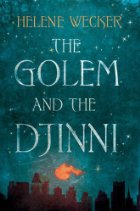 Chava, a golem only a few days old, is stranded on a boat to New York City in the early twentieth century with no idea who she is, how to live, or where to go. Ahmad is a djinn trapped in a bottle for centuries, unleashed accidentally by a Syrian metalsmith. These two unlikely friends meet and immediately understand what it is to be different from everyone around them. But as those differences force them apart, will they find their way back to one another? Chava, a golem only a few days old, is stranded on a boat to New York City in the early twentieth century with no idea who she is, how to live, or where to go. Ahmad is a djinn trapped in a bottle for centuries, unleashed accidentally by a Syrian metalsmith. These two unlikely friends meet and immediately understand what it is to be different from everyone around them. But as those differences force them apart, will they find their way back to one another?
The Golem and the Djinni is a book that I’ve seen all over the Internet in the last few months. It’s received so many positive reviews that I thought it was well worth reading, not to mention the fact that its blurb compared it to Jonathan Strange and Mr Norrell, a book that I adored. The decision was a good one as I greatly enjoyed this tale of turn of the century New York and its two unusual occupants. The book was certainly heavy on the fantasy, but it worked within the story.
One of the aspects of the book that I found very interesting was the way that the two fantasy characters got adopted into different nationalities. Both of them are effectively christened by and welcomed into the Jewish and the Syrian communities in New York, appropriately in both cases. I know life in the city was difficult for immigrants at the time, with so many seeking the American dream and failing to find that the streets were paved in gold. Instead, many of them found prejudice and further poverty. But I love stories about it anyway, particularly the way that immigrants sought familiarity and made their own little communities, and I enjoyed the way these two were still further distanced even from those immigrants. They are a world unto themselves, even while many of their experiences are echoed by others.
The fantasy aspects themselves are well integrated within the novel; I didn’t think the world felt too inconsistent. Both Chava and Ahmad belong distinctly to Old World mythology. They are creatures which have long been consigned to tales, but which truly existed in their own parts of the world. As such, when people close to them realize what they are, they often understand the nature of their beings but have a difficult time imagining that they’re real. They delve into old books and legends to find out the truth, which of course adds just another layer to the book’s appeal.
And, of course, there is the relationship between Chava and Ahmad. It took some time for them to meet, and their initial interactions are tentative, but the way they work together makes sense, even if they aren’t technically human. It was easy for me to relate to both characters and I was very invested in the outcomes of their lives.
I really enjoyed this read – I would definitely recommend The Golem and the Djinni to those who enjoy a mix of fantasy and historical fiction.
All external book links are affiliate links. I received this book for free for review.
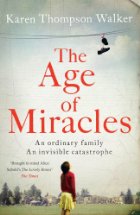 When Julia is eleven years old, the rotation of the earth begins slowing down. Life changes in at first imperceptible ways as days and nights lengthen, but the potential consequences for the planet are huge. As a young girl just coming into her teenage years, though, Julia continues growing up. Plagued by loneliness, introverted Julia discovers things about those she loves, much of which she’d rather not know. She suffers through crushes, choosing what to wear, learning how to flirt, and deciding what she wants to do with her life, while all the while in the background the earth’s rotation starts to narrow the possibilities. When Julia is eleven years old, the rotation of the earth begins slowing down. Life changes in at first imperceptible ways as days and nights lengthen, but the potential consequences for the planet are huge. As a young girl just coming into her teenage years, though, Julia continues growing up. Plagued by loneliness, introverted Julia discovers things about those she loves, much of which she’d rather not know. She suffers through crushes, choosing what to wear, learning how to flirt, and deciding what she wants to do with her life, while all the while in the background the earth’s rotation starts to narrow the possibilities.
This is a short, intensely thoughtful book, a coming of age for Julia amidst speculation on what would actually happen if an apocalyptic event, no matter how minor at first, took place. When the books starts everything is normal. Julia has a best friend, a crush, piano lessons, soccer, school; over the course of the book, some of these erode away as the fabric of life changes drastically. People suffer from lack of daylight and some crops no longer grow. Animals, and then people, get sick. While there is time to plan, there is never enough time, and the future is consistently uncertain.
Growing up in this climate makes life even more difficult for Julia. She’s shy and has no idea how to act around potential friends or boyfriends. Everyone and everything is changing around her and she feels left behind and as though she’s standing still. It is so easy to feel for her and understand that transition period between girlhood and womanhood, when you’re not quite sure if all of the other girls know what they’re doing but you feel they must be ahead of you. The earth is slowing and, to an extent, so is Julia. This is what makes the book so introspective – we spend the entire time inside Julia’s head, only really understanding her perspective on things and finding what changes her.
I liked this book; I liked the way it made me think about how much we take the world for granted (a lesson everyone needs sometimes) and what would happen if things changed so catastrophically. I wouldn’t have minded if the book pushed this further, though, in the vein of a full science fiction novel. Some of the effects this might have on civilization are explored, but not in that much depth. I also liked Julia, although at times she was too internally focused even for me. Some of the interactions she has with other characters are just uncomfortable, which I suspect is the point. I’d also have liked the book to last longer; at the end we’re told she’s 23 but that skips out a decade of her life, so it feels as though the plot threads aren’t wrapped up properly.
Overall I felt I’d finished The Age of Miracles looking for more; this was a wonderful concept and I enjoyed it, but I really just wanted to spend more time learning about what might happen and where Julia’s life went after that year.
All external links are affiliate links. I received this book for free for review.
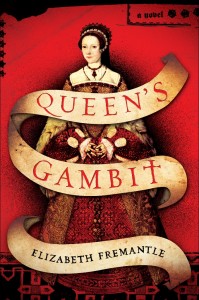 When her second husband dies of cancer, Katherine Parr returns to court to attend Lady Mary, Henry VIII’s elder daughter. Though she’s quickly enchanted by her brother’s friend Thomas Seymour, Katherine catches the King’s eye unintentionally and before she knows it, she’s Queen of England, with her every word, step and expression monitored intensely by her husband and the court. Katherine’s life is regularly at risk. One of her few allies is her stepdaughter’s friend, Dorothy Fowndon. Dot is a lowborn girl brought into service for Katherine’s relatively ordinary life, who remains close to the Queen and is raised up by faithful service to be a gentlewoman. But an existence so close to Henry VIII is dangerous, as his previous wives showed, and Katherine and Dot must always be on their best behaviour or risk losing their heads to his whims. When her second husband dies of cancer, Katherine Parr returns to court to attend Lady Mary, Henry VIII’s elder daughter. Though she’s quickly enchanted by her brother’s friend Thomas Seymour, Katherine catches the King’s eye unintentionally and before she knows it, she’s Queen of England, with her every word, step and expression monitored intensely by her husband and the court. Katherine’s life is regularly at risk. One of her few allies is her stepdaughter’s friend, Dorothy Fowndon. Dot is a lowborn girl brought into service for Katherine’s relatively ordinary life, who remains close to the Queen and is raised up by faithful service to be a gentlewoman. But an existence so close to Henry VIII is dangerous, as his previous wives showed, and Katherine and Dot must always be on their best behaviour or risk losing their heads to his whims.
I’ve always known Katherine Parr as the wife that finally survived Henry VIII, probably like most people who have even a remote interest in history. I remembered the framework of her life simply because I’ve been interested in Tudor history for years; I knew who she married and how she died, and that she was close at one point to Elizabeth, not yet too close to the throne at that point. But I couldn’t have imagined what a complex and touching story that an author like Fremantle could weave out of that framework. This is a fantastic book and one that easily transported me to the Tudor history I remember loving before the volume of books became overwhelming.
It was easy for me to feel as though I understood how difficult Katherine’s situation was. No one could escape the king, certainly not by this point; he’s already beheaded two wives for sins which may well have been fabricated and his mercurial moods mean that Katherine could easily be next. She can’t refuse him, even though her head is completely turned by Thomas Seymour. And that means she must endure marriage to him, at this point a much older, diseased, immense man who has been used to getting his own way for decades. And to make matters worse she’s never carried a baby to term. As such it’s a matter of dread that she’ll almost certainly never conceive a backup prince for the king. Eventually that might be her downfall, and there is absolutely nothing she can do to prevent it. I felt very strongly for her.
One aspect that helped this book rise above a lot of the historical fiction I’ve read in the past few years was the secondary story of Dot. Though this part was probably ahistorical, as acknowledged by the author, Dot gave a wonderful second opinion of Katherine and had her own part to play as she grew up at court. It’s a classic outsider perspective that provides value to the main narrative, but I also appreciated her sweet romance (and other sidetracks), simpler by nature than the queen’s but still complex and challenging in its own way. While other books try to provide this perspective, Fremantle succeeded hugely and I became invested in the stories of both women.
Even if you think you’re sick of Tudor historical fiction, I recommend you give Queen’s Gambit a try. It was a welcome breath of fresh air for me, beautifully written and imagined, with an engaging story that allowed me to step right into history. Highly recommended.

I received this book for review as part of the Historical Fiction Virtual Book Tour. Find the rest of the tour schedule here.
All external book links are affiliate links.
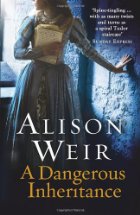 For Lady Katherine Grey, sister of Lady Jane Grey, Edward VI’s chosen heir, the Wars of the Roses lie in the past. Already, tales of Richard III are growing in exaggeration as the Tudor monarchs do their best to establish their rightful rule. For Katherine Plantagenet, illegitimate daughter of Richard III, the Wars of the Roses control her life, and she watches as her beloved father’s reputation sinks and her royal cousins vanish in real time. What ties these two women together is their curiosity and somehow urgent need to know what happened to the two little princes, as their individual dramas and struggles control their lives in the present. For Lady Katherine Grey, sister of Lady Jane Grey, Edward VI’s chosen heir, the Wars of the Roses lie in the past. Already, tales of Richard III are growing in exaggeration as the Tudor monarchs do their best to establish their rightful rule. For Katherine Plantagenet, illegitimate daughter of Richard III, the Wars of the Roses control her life, and she watches as her beloved father’s reputation sinks and her royal cousins vanish in real time. What ties these two women together is their curiosity and somehow urgent need to know what happened to the two little princes, as their individual dramas and struggles control their lives in the present.
I was sure I’d reviewed another of Alison Weir’s novels at one point or another, but I can’t find any that I’ve actually posted. Never mind – I’ve reviewed a number of her non-fiction books and I do tend to like them. I often find her fiction dry, though, and unfortunately A Dangerous Inheritance wasn’t an exception to that. I didn’t have any expectations going in, so I don’t think it’s down to a famous name. I think it was a combination of factors.
First, though, what I liked about the book. I love the way Weir throws in many details about the period. Right away I spotted that a jewel of Kate’s was clearly modelled after the Middleham Jewel. She uses real letters, real sources, and includes descriptions that simply feel spot on. I loved these details and knowing that Weir had researched this period to a degree where she could recreate what happened effectively.
The book also opens dramatically, setting up both Kate and Katherine’s stories in a way that immediately caught my attention. I was in particular interested in Katherine, because while I knew what happened to Jane, I couldn’t remember what happened to her sisters, and definitely didn’t predict Katherine’s life.
Unfortunately, after that, I felt that the book dragged on. Towards the middle, we reach a point where the women, though still teenagers, are both fixated and in love with men that they simply cannot have for different reasons. They seemed to spend an eternity pining for their respective lovers, to the degree that even while quite a bit else was happening, they languished over this for ages. I hardly felt like these wronged lovers really deserved much emotional attachment, and I ended up just wanting to know what happened to them at the end. Their relationships feel contrived, not genuine, and I think this held the book back.
Secondly, towards the end, when Katherine is putting together the story of the princes in the Tower, I quite frankly just got bored. She spends time reading all the big names and chronicles to see what happened, and then goes through a lengthy pages-long process justifying why ultimately she believes Thomas More and has come to the same conclusions as Weir herself. In non-fiction – fine, this is exactly what I want to read. In fiction – not so much. I wasn’t convinced by Katherine’s arguments, and as I actually haven’t read Weir’s own non-fiction book on the Wars of the Roses, I can’t comment on her views either.
Bizarrely, though the novel follows that extremely logical approach to determining what happened to the princes, it contains some oddly-placed supernatural elements, generally when one woman is in a place where something significant happened to the other. As I didn’t really get the connection between them anyway, these segments felt out of place. The connection seemed contrived to me; all the women had in common was their names and the fact that they were interested in the princes. Their positions were both close to the throne, but Kate would never be a threat to her father’s kingship, while Katherine’s life was dominated by the fact that she was very few steps from the throne at all times and was a potential magnet for discontented European and English powers.
Ultimately, I found A Dangerous Inheritance disappointing. I think I’ll stick to Weir’s non-fiction in the future.
All external links are affiliate links. I received this book for free for review.
|
|
 The revolutionaries are taking France over. Before Marie Antoinette realizes it, they’ve invaded her home and threatened the lives of her family and loved ones. Marie Antoinette herself is reviled as a foreign, an inconsiderate woman who has no discrimination about who she sleeps with or why. She must be the cause of all the wrongs that the people have experienced and they are calling for her head. The Revolution is right at the gates of Versailles and the once-loved King and Queen of France become, somehow, enemies of the people, prisoners of the state, their lives hanging by fragile threads.
The revolutionaries are taking France over. Before Marie Antoinette realizes it, they’ve invaded her home and threatened the lives of her family and loved ones. Marie Antoinette herself is reviled as a foreign, an inconsiderate woman who has no discrimination about who she sleeps with or why. She must be the cause of all the wrongs that the people have experienced and they are calling for her head. The Revolution is right at the gates of Versailles and the once-loved King and Queen of France become, somehow, enemies of the people, prisoners of the state, their lives hanging by fragile threads.


 Katie O’Toole is the unlucky thirteenth child of Irish immigrants, living in the wilds of Pennsylvania, when Native Americans attack her small town and kill many of her family. Katie, however, with her flaming red hair and bright blue eyes, is hailed by one of the natives as the subject of his vision. Instead of being harmed, she is treated as precious and given the “choice” of going along with two natives – both of a different clan than the attackers – or staying with her family and being ransomed back to her family. For Katie this requires almost no thought, as she’s spent her life in unappreciated semi-servitude to her parents and siblings, but she vastly underestimates the difficulties that face her as she and her two new companions make their way west.
Katie O’Toole is the unlucky thirteenth child of Irish immigrants, living in the wilds of Pennsylvania, when Native Americans attack her small town and kill many of her family. Katie, however, with her flaming red hair and bright blue eyes, is hailed by one of the natives as the subject of his vision. Instead of being harmed, she is treated as precious and given the “choice” of going along with two natives – both of a different clan than the attackers – or staying with her family and being ransomed back to her family. For Katie this requires almost no thought, as she’s spent her life in unappreciated semi-servitude to her parents and siblings, but she vastly underestimates the difficulties that face her as she and her two new companions make their way west. Twelve year old William is an orphan, as far as he knows. From the moment his mother’s limp body was carried away five years ago, he’s been a lost soul at an orphanage in Seattle. He has a few friends, including his blind best friend Charlotte, but he longs for a family. As a Chinese-American, though, his chances for adoption are incredibly slim, and he’s resigned himself to years of the same treatment. On the orphans’ collective, made-up birthday, he’s taken to see a movie. To his shock, William recognizes an actress in the film – his mother! Willow Frost looks and sounds just like the beautiful mother he lost five years ago. William decides that he simply must find her and begins in earnest to seek his family again.
Twelve year old William is an orphan, as far as he knows. From the moment his mother’s limp body was carried away five years ago, he’s been a lost soul at an orphanage in Seattle. He has a few friends, including his blind best friend Charlotte, but he longs for a family. As a Chinese-American, though, his chances for adoption are incredibly slim, and he’s resigned himself to years of the same treatment. On the orphans’ collective, made-up birthday, he’s taken to see a movie. To his shock, William recognizes an actress in the film – his mother! Willow Frost looks and sounds just like the beautiful mother he lost five years ago. William decides that he simply must find her and begins in earnest to seek his family again. In the seventh installment of Bernard Cornwell’s Warrior Chronicles, Uhtred of Bebbanburg has fallen from the favour of the King of Wessex. Unfortunately, he’s also fallen from the favour of the Mercians. Double dealing drives him from his home and he decides that the time is ripe to take back what is his – Bebbanburg. Leading a small band of loyal retainers north, Uhtred sneaks his way into the home of his ancestors, but capturing what is his may be a goal that eludes him once again. As Danes and Saxons struggle for control of the British isles, where will Uhtred fit in?
In the seventh installment of Bernard Cornwell’s Warrior Chronicles, Uhtred of Bebbanburg has fallen from the favour of the King of Wessex. Unfortunately, he’s also fallen from the favour of the Mercians. Double dealing drives him from his home and he decides that the time is ripe to take back what is his – Bebbanburg. Leading a small band of loyal retainers north, Uhtred sneaks his way into the home of his ancestors, but capturing what is his may be a goal that eludes him once again. As Danes and Saxons struggle for control of the British isles, where will Uhtred fit in? In all four corners of the world, people are about to die. Every moment, someone’s struggle comes to an end. But suddenly, death stops. No one can die, even those with mortal wounds. All of the citizens in the Kingdom of Lethe are perplexed and terrified. Battles rage on, assassinations fail spectacularly, and the elderly continue suffering past their time. Then Death himself arrives and asks for his Cobweb Bride. Only once his bride is found will death resume and the kingdom return to normal. But with no sign of the Cobweb Bride and no hints on where to find her, how will the citizens restore normality to their lives?
In all four corners of the world, people are about to die. Every moment, someone’s struggle comes to an end. But suddenly, death stops. No one can die, even those with mortal wounds. All of the citizens in the Kingdom of Lethe are perplexed and terrified. Battles rage on, assassinations fail spectacularly, and the elderly continue suffering past their time. Then Death himself arrives and asks for his Cobweb Bride. Only once his bride is found will death resume and the kingdom return to normal. But with no sign of the Cobweb Bride and no hints on where to find her, how will the citizens restore normality to their lives? Chava, a golem only a few days old, is stranded on a boat to New York City in the early twentieth century with no idea who she is, how to live, or where to go. Ahmad is a djinn trapped in a bottle for centuries, unleashed accidentally by a Syrian metalsmith. These two unlikely friends meet and immediately understand what it is to be different from everyone around them. But as those differences force them apart, will they find their way back to one another?
Chava, a golem only a few days old, is stranded on a boat to New York City in the early twentieth century with no idea who she is, how to live, or where to go. Ahmad is a djinn trapped in a bottle for centuries, unleashed accidentally by a Syrian metalsmith. These two unlikely friends meet and immediately understand what it is to be different from everyone around them. But as those differences force them apart, will they find their way back to one another? When Julia is eleven years old, the rotation of the earth begins slowing down. Life changes in at first imperceptible ways as days and nights lengthen, but the potential consequences for the planet are huge. As a young girl just coming into her teenage years, though, Julia continues growing up. Plagued by loneliness, introverted Julia discovers things about those she loves, much of which she’d rather not know. She suffers through crushes, choosing what to wear, learning how to flirt, and deciding what she wants to do with her life, while all the while in the background the earth’s rotation starts to narrow the possibilities.
When Julia is eleven years old, the rotation of the earth begins slowing down. Life changes in at first imperceptible ways as days and nights lengthen, but the potential consequences for the planet are huge. As a young girl just coming into her teenage years, though, Julia continues growing up. Plagued by loneliness, introverted Julia discovers things about those she loves, much of which she’d rather not know. She suffers through crushes, choosing what to wear, learning how to flirt, and deciding what she wants to do with her life, while all the while in the background the earth’s rotation starts to narrow the possibilities. When her second husband dies of cancer, Katherine Parr returns to court to attend Lady Mary, Henry VIII’s elder daughter. Though she’s quickly enchanted by her brother’s friend Thomas Seymour, Katherine catches the King’s eye unintentionally and before she knows it, she’s Queen of England, with her every word, step and expression monitored intensely by her husband and the court. Katherine’s life is regularly at risk. One of her few allies is her stepdaughter’s friend, Dorothy Fowndon. Dot is a lowborn girl brought into service for Katherine’s relatively ordinary life, who remains close to the Queen and is raised up by faithful service to be a gentlewoman. But an existence so close to Henry VIII is dangerous, as his previous wives showed, and Katherine and Dot must always be on their best behaviour or risk losing their heads to his whims.
When her second husband dies of cancer, Katherine Parr returns to court to attend Lady Mary, Henry VIII’s elder daughter. Though she’s quickly enchanted by her brother’s friend Thomas Seymour, Katherine catches the King’s eye unintentionally and before she knows it, she’s Queen of England, with her every word, step and expression monitored intensely by her husband and the court. Katherine’s life is regularly at risk. One of her few allies is her stepdaughter’s friend, Dorothy Fowndon. Dot is a lowborn girl brought into service for Katherine’s relatively ordinary life, who remains close to the Queen and is raised up by faithful service to be a gentlewoman. But an existence so close to Henry VIII is dangerous, as his previous wives showed, and Katherine and Dot must always be on their best behaviour or risk losing their heads to his whims.
 For Lady Katherine Grey, sister of Lady Jane Grey, Edward VI’s chosen heir, the Wars of the Roses lie in the past. Already, tales of Richard III are growing in exaggeration as the Tudor monarchs do their best to establish their rightful rule. For Katherine Plantagenet, illegitimate daughter of Richard III, the Wars of the Roses control her life, and she watches as her beloved father’s reputation sinks and her royal cousins vanish in real time. What ties these two women together is their curiosity and somehow urgent need to know what happened to the two little princes, as their individual dramas and struggles control their lives in the present.
For Lady Katherine Grey, sister of Lady Jane Grey, Edward VI’s chosen heir, the Wars of the Roses lie in the past. Already, tales of Richard III are growing in exaggeration as the Tudor monarchs do their best to establish their rightful rule. For Katherine Plantagenet, illegitimate daughter of Richard III, the Wars of the Roses control her life, and she watches as her beloved father’s reputation sinks and her royal cousins vanish in real time. What ties these two women together is their curiosity and somehow urgent need to know what happened to the two little princes, as their individual dramas and struggles control their lives in the present.






Recent Comments